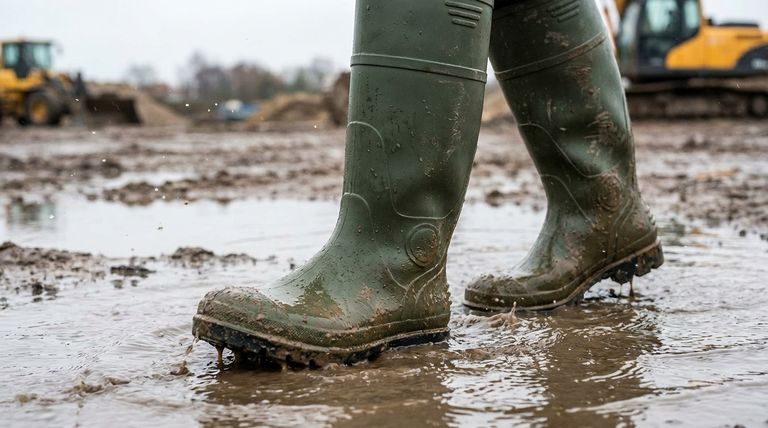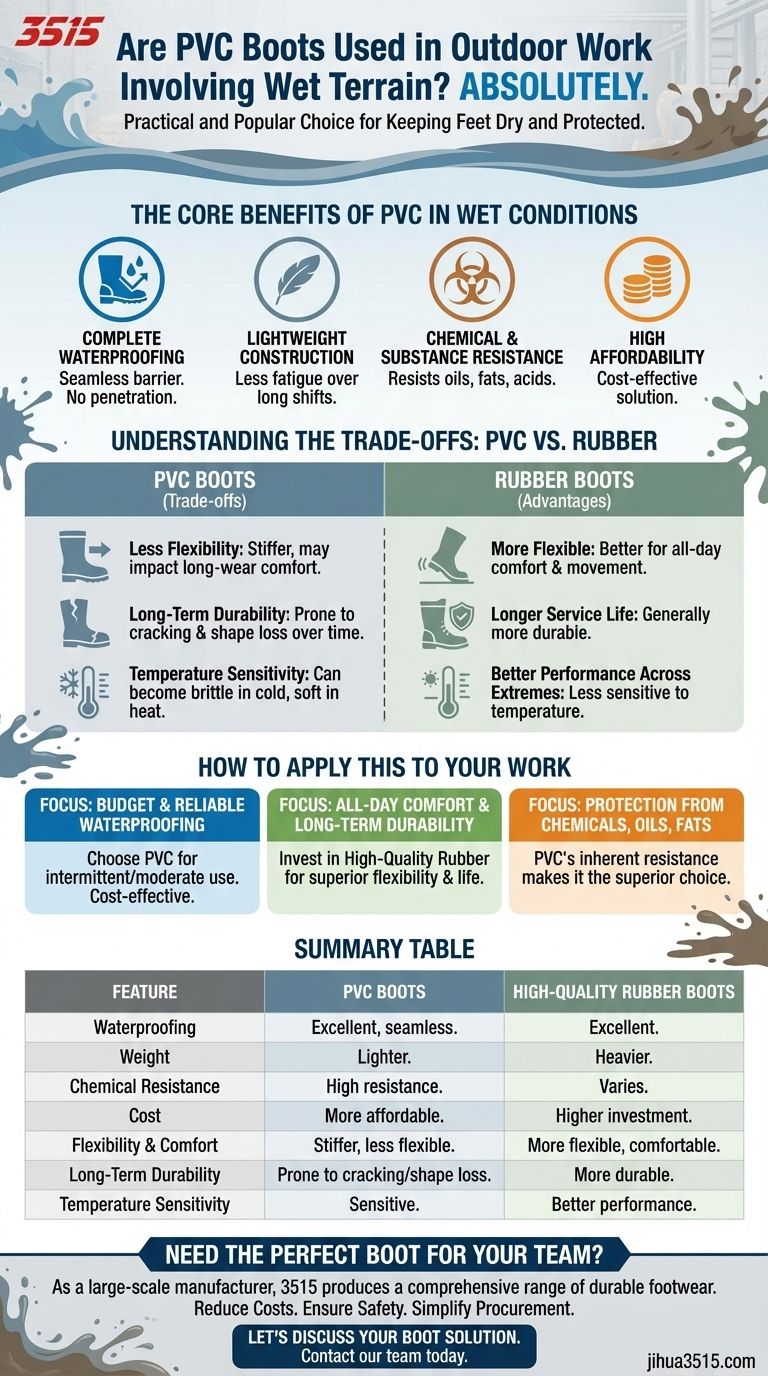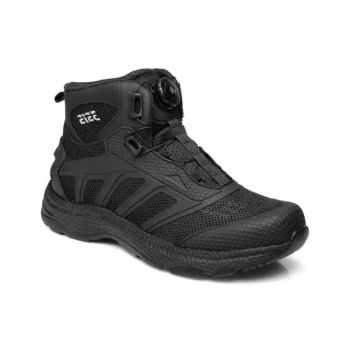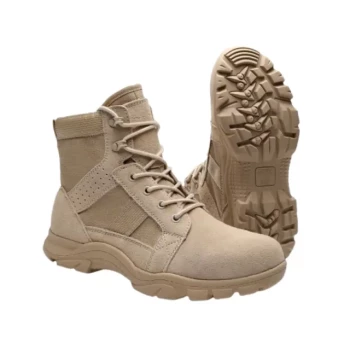Absolutely. PVC (polyvinyl chloride) boots are frequently used for a wide variety of outdoor jobs that involve wet, muddy, or slick terrain. Their inherent material properties make them a practical and popular choice for keeping feet dry and protected in demanding environments.
The core decision is not if PVC boots are suitable for wet work, but why you would choose them over alternatives. While they offer excellent waterproofing and affordability, this comes with trade-offs in long-term durability and flexibility compared to materials like rubber.

The Core Benefits of PVC in Wet Conditions
Understanding why PVC is a common choice starts with its fundamental material advantages. For many professionals, these benefits provide the ideal solution for their daily work.
Complete Waterproofing
PVC material creates a completely non-porous, seamless barrier. This ensures that water, mud, and other liquids cannot penetrate the boot, keeping your feet entirely dry and comfortable.
Lightweight Construction
PVC boots are generally lighter than their rubber counterparts. This reduction in weight can significantly decrease fatigue for workers who are on their feet for extended hours, making a noticeable difference over a long shift.
Chemical and Substance Resistance
One of the key strengths of PVC is its resistance to a wide range of substances. This includes many common oils, fats, acids, and cleaning agents, making these boots ideal for industries beyond just landscaping or construction, such as food processing.
High Affordability
Compared to high-quality rubber or leather boots, PVC boots are typically much more cost-effective. This makes them an accessible option for individuals, large crews, or for jobs where boots need to be replaced frequently.
Understanding the Trade-offs: PVC vs. Rubber
No material is perfect. The decision to use PVC boots requires an objective look at their limitations, especially when compared directly to high-quality rubber boots.
Flexibility and On-Foot Comfort
PVC is generally a stiffer material than natural rubber. While this provides structure, it can mean less flexibility when walking, squatting, or climbing, which may impact comfort over a full workday.
Long-Term Durability and Shape
Over time and with heavy use, PVC boots can be more prone to losing their original shape. They can also become brittle and crack more easily than rubber, particularly in fluctuating temperatures, making them a less durable long-term investment.
Temperature Sensitivity
The stiffness of PVC can be exaggerated in cold weather, making the boots feel rigid. Conversely, in very high heat, the material can become overly soft. This sensitivity can affect both comfort and performance depending on your climate.
How to Apply This to Your Work
Your choice of boot should be a direct response to the specific demands of your job. The "best" boot is the one that best aligns with your primary needs.
- If your primary focus is budget and reliable waterproofing: PVC boots are an excellent, cost-effective solution for intermittent or moderate daily use.
- If your primary focus is all-day comfort and long-term durability: You should consider investing in high-quality rubber boots, which offer superior flexibility and a longer service life.
- If your primary focus is protection from chemicals, oils, or fats: PVC's inherent material resistance often makes it the superior and safer choice for your environment.
Ultimately, choosing the right boot means matching the material's specific strengths to the unique demands of your work.
Summary Table:
| Feature | PVC Boots | High-Quality Rubber Boots |
|---|---|---|
| Waterproofing | Excellent, seamless barrier | Excellent |
| Weight | Generally lighter | Can be heavier |
| Chemical Resistance | High resistance to oils, acids, fats | Varies by compound |
| Cost | More affordable | Higher initial investment |
| Flexibility & Comfort | Stiffer, less flexible | More flexible, often more comfortable for long wear |
| Long-Term Durability | Prone to cracking and losing shape over time | Generally more durable and long-lasting |
| Temperature Sensitivity | Can become brittle in cold, soft in heat | Better performance across temperature extremes |
Need the Perfect Boot for Your Team's Specific Conditions?
As a large-scale manufacturer, 3515 produces a comprehensive range of durable footwear for distributors, brand owners, and bulk clients. Our production capabilities encompass all types of safety boots and work boots, including specialized PVC and rubber options tailored to your industry's demands.
We help you:
- Reduce Costs: Benefit from our large-scale manufacturing efficiency.
- Ensure Safety: Get boots built to protect against water, chemicals, and hazards.
- Simplify Procurement: A single source for all your footwear needs.
Let's discuss the best boot solution for your work environment.
Contact our team today for a consultation to get durable, high-performance footwear for your workforce.
Visual Guide

Related Products
- Safety Footwear Wholesale Manufacturer for Custom OEM/ODM Production
- Premium Flame-Retardant Waterproof Safety Boots and Shoes
- Wholesale Safety Footwear Manufacturer for Bulk & Custom OEM Orders
- Premium High-Cut Waterproof Safety Boots Manufacturing & Wholesale Solutions
- High Performance Fire-Retardant Waterproof Safety Boots
People Also Ask
- Can heavy duty work boots be worn daily outside of work? Discover Durable, All-Day Comfort
- How does the welt contribute to the longevity of boots? The Key to Decades of Serviceable Footwear
- What does metatarsal protection in ASTM standards involve? Essential Guide to Instep Safety
- Why is wearing proper construction footwear important in accident-prone job sites? Protect Your Workforce
- Why are moisture-wicking and breathable linings necessary for Work Boots? Optimize Heat Management and Foot Health
- What does the ASTM F2413-18 certification ensure for work boots? A Guide to Decoding Safety Ratings
- What features should warehouse workers look for in work boots? Prioritize Safety, Slip Resistance & All-Day Comfort
- What factors should be considered when choosing between PVC, neoprene, and rubber work boots?



















